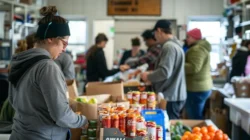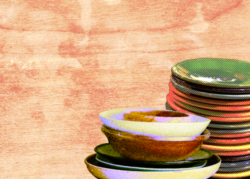In the last of the New South rehearsal rooms—past the 40 or so students practicing an Indian dance in a line; in the next, some 20 boys and girls watched another student show them where to put their hands to waltz—Lucy Obus (COL ‘11) slipped in her socks while strutting towards a collection of chairs and falls hard on her side. “Whoops!” she called before scrambling to her feet—“I’m ok! Let’s do this!” Mady Greene (COL ’10), started the song for the 15th time, the girls straddled their chairs, and dance rehearsals for Cabaret continued.
Cabaret is Mask & Bauble’s last show of the year, the company’s annual spring musical. First performed on Broadway in 1966, the show features music and lyrics by Fred Ebb and John Kander of Chicago and Fosse fame. An American writer, Cliff, comes to Berlin in 1929 seeking inspiration, and finds it in Sally Bowles, an irrepressible British girl who dances at the debauched Kit Kat Klub. The whole play is framed as an evening in the Klub, with a pansexual emcee, dancing chorus girls and the audience playing the role of the Klub patrons, as the story unfolds in and out of the club.
For director Sally Jesmonth (SFS ’08), Cabaret provided an opportunity to “approach [a musical] from a historical, cultural perspective, not just a lot of jazz hands.” She chose this particular play because in addition to its “great music,” she had developed an interest in Weimar-era Germany after writing a paper about the period for a history class. For her, the play offered an opportunity to examine the “tension between reason and Nazism, and how one system overcame another system.”
Jesmonth has worked on the spring musical every year she’s been at Georgetown, as a technical staffer, stage manager and more. As an upperclassman, she’s in the minority for Cabaret: almost all the actors and production staff are freshmen and sophomores, with the exception of some of the heads of different tech departments. This is fairly typical for the spring musical—juniors often go abroad in the spring, and seniors are usually loath to have any commitments mar their last semester. Jesmonth acknowledged that working with a young cast is a challenge. This year, like last, an inexperienced cast member underestimated how much of a commitment the show would be and dropped out after a few weeks. The part had to be frantically recast.
“They are enthusiastic and awesome, but they don’t know how we do things here,” she said. “There are no juniors and seniors as role models who understand what M&B is and how it works.”
For Obus, who plays one of the Kit Kat Klub dancers and is acting in her first musical role at Georgetown, there are advantages to having so many fresh faces.

“I think there’s less ego with people who’ve never done a show before,” she said. “You get less of people who are like ‘Oh, when I was in Hamlet…’”
Olivia Bennett (COL ’10), who plays Sally Bowles, marveled at the contrast in experience between this show and the other shows she’s done, non-musical plays in the fall that usually had an older cast. Still, she said she was “amazed and intimidated at the talent of the cast, and rightly so.”
Talent aside, the bonds that the cast and crew develop during their hours of practice is a large part of the appeal of an M&B show. Affection is liberally displayed, and cast members regularly avow their adoration for everyone around them. Every disciplinary moment or “focus, guys!” is followed by a very theatrical “I love you!” or a full-body hug. People are greeted in trilling voices—“Oh, look, it’s Sarah Strole!”—or with sudden sexual poses and gestures.
“It sounds cliché to say we all love each other, but we all mesh really well,” Bennett said. “We laugh a lot, for better or worse.”
Despite all the declarations of group love, there is a distinct desire to be even closer, to become best friends with everyone who’s working on the show. Maher Ali (COL ’11) the stage manager, sends out scheduling e-mails that include exhortations like “YOU HAVE TO BOND.” When I mention that they all seem to be friends already, everyone explains that what they really need is to be “more friends”—“drunk friends!”
“What’s interesting for Cabaret, for the Klub people, is it’s a very physical, sexual show, and people got closer and comfortable faster,” Joelle Thomas (SFS ’10), who plays Fraulein Schneider, the main character’s landlady, said. “They’re touching each other in places you wouldn’t normally touch each other. That barrier—what’s appropriate and what’s inappropriate—was totally shattered by the choreography.”

Some cast members, though, almost “revel in the discomfort” that the sexual situations can produce, as one put it.
“The awkwardness is kind of funny,” Jon Tosetti (COL ’10) who plays various ensemble parts, said. “I’m pretty sure if you auditioned for this show you have no problem with that.” This is likely true—the audition form included questions like “Cabaret has several sexually suggestive scenes. Are you comfortable with same-sex acting situations, such as kissing?” and “Many of the costumes will likely be revealing, i.e. some men will not be wearing shirts, some cast members will be wearing lingerie. Are you willing to perform under these costume conditions? Please elaborate.”
Obus sees the sexual aspects of the show as a draw, particularly for college students. She talks about tapping into Lady Marmalade or other pop culture images when she dances, and points out that students who may not be interested in broader themes of social unrest or political movements can still see the appeal of sexy dancing. “Even if they don’t like it,” she says, “it’s like ‘oh, they’re dancing like whores.’”
The salacious aspects of the story can overwhelm the more serious messages even for a cast member. “It’s all this hilarious sexual nitty gritty, and then oh, there’s Nazism!” she said. “You forget sometimes.”
The atmosphere at a Cabaret rehearsal is a mix of barely-concealed giddiness and exhausted lethargy. The scenes are performed amidst the debris left over from whatever was previously happening in that room, boxes and newspapers or folding chairs and tables. The cast and crew eat dinner while watching, or sit in the audience looking tired. Everyone has homework in front of them, but they rarely seem to be doing it. Brad Glasser (COL ’11) flips through flashcards while onstage during the design run. The dancers are always in leggings, sweats, tank tops and toe shoes, carrying water bottles everywhere they go, and other cast members can be found running around hugging each other and talking in German accents, just for kicks.

Yet despite the frivolity in the corners, what’s happening onstage still matters most. The offstage cast members laugh at the good moments, clap at the big parts and sing the songs even when they don’t have to. When Jesmonth has something to say and the actors on stage look up, it’s as if a trance is broken. The audience shifts in their seats, pulled out from the spell of Sally and Cliff’s first kiss or the cruelty that Fraulein Schneider endures. Dennis said that even when she’s listening from the hallway, “when Matt sings ‘don’t go,’ its like ‘Okay, I’m not going!’”
Bennett, who speaks with an accent for her British character, was born in England, and her mother is a British actress. She has given Sally’s accent serious thought.
“She’s not entirely Cockney, she was surrounded by it, that’s where Chelsea is,” she said. “But she’s from a middle class family, so it’s not really posh.”
Like her character Sally, Bennett always seems to be acting, even in her offstage life, and clearly relishes the experience. “I have to remember to turn off the accent after the rehearsal,” she said with a laugh. “I fail fairly miserably at that. Lucky I didn’t have to do German!”
She has a comfortable relationship with Matt Lai (COL ’11), who plays Cliff, her partner, and when they stand next to each other they look sort of alike—long, lithe and tan, full of loose energy with big expressive eyes. But neither of them, nor the rest of the cast, looks natural carrying power tools around when they’re called to set up or help out with the tech stuff—they look out of place. The sets are built by the tech people and by the actors themselves, who are responsible for a set amount of “tech hours,” where they go to the design shop in the Davis Center to build, paint and saw. It’s like a construction site, complete with a machine that blows air on you to get the wood shavings off. Loud alternative rock music blasts and a sign reads “I am GODZILLA, you are JAPAN.” Cabaret’s cast and crew work with Ted Parker, the technical director of the Program of Performing Arts and a sort of elder statesman for the technical aspects of student theatrical productions. He constantly tells people to put on ear and eye protection and spouts wisdom like, “tools are just like your friends: if you respect them and take care of them, they’ll never bite you in the ass.”

Jesmonth has given as much thought to the design and technical aspects of the show as she has to the characters.
“Cabaret is about transition, modernism versus Nazism,” she said. “It’s all experimenting with ideas, nothing permanent, which comes through in the set. As such, the set has lots of moving doors, sliding opaque windows, and drastic changes in lighting between the Cabaret scenes and the everyday life.

Producer Sarah Strole (COL ’10) oversees everything that happens offstage—the coordination of designers, people and publicity, where the money will go and who will be in charge of finding the best shoes. At rehearsals she lingers at the sides, taking note of what will have to be changed and rearranged. Individual designers are responsible for their areas—props, make up, set design, lighting, costumes—with a few “technical directors” and stage managers, who are usually older and more experienced, as overseers. At rehearsals or design runs, the design people can often be found in corners, talking animatedly about ideas from books of pictures from the 30’s. As a period piece, Cabaret means finding all sorts of exciting relics of the past. Lighting director Austin Williams (SFS ‘08) already has a copy of Mein Kampf—“from the last time I did Cabaret, people!”—as he’s quick to point out.

Naturally, things get more frantic the closer the show gets to opening night on Wednesday. There is a palpable energy at rehearsals and set building now, and Jesmonth has an ear infection, as she always does at this point. But for many people who are involved in the production, it seems to be less about the final product than about the experience.
Some of the underclassmen will drift back into non-theatrical Georgetown life while others become those M&B “old hands” everyone is always talking about. Either way, they did the show to be part of something, and that’s what they got. “That’s the great thing about theater,” Dennis said. “You love everyone. There’s a lotta love.” She laughs, and shows off the leopard-print soles on her high-heeled pumps while Lai and Obus practice fake punches.
It’s moments like this that brought them to theater in the first place, and regardless of the accolades or t-shirts they get, for these people, it’s all about the love.
…..
CABARET will be at Poulton Hall April 16-20; Tickets available at www.performingarts.georgetown.edu




